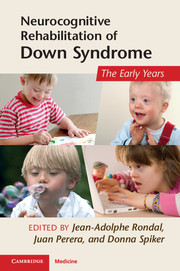Book contents
- Frontmatter
- Contents
- List of contributors
- Preface
- Acknowledgments
- Section 1 Definition, history, methodology, and assessment
- Section 2 Genetics, brain, and animal models
- Section 3 Pharmacological and medical management and treatment
- Section 4 Early development and intervention
- Section 5 Therapeutic perspectives
- Conclusions
- Index
Conclusions
Published online by Cambridge University Press: 05 July 2011
- Frontmatter
- Contents
- List of contributors
- Preface
- Acknowledgments
- Section 1 Definition, history, methodology, and assessment
- Section 2 Genetics, brain, and animal models
- Section 3 Pharmacological and medical management and treatment
- Section 4 Early development and intervention
- Section 5 Therapeutic perspectives
- Conclusions
- Index
Summary
More states and governments are promulgating laws and regulations ensuring that early education and care for the child with a congenital handicap and her/his family is readily available on an equal basis for everybody. Conceptually and technically, major progress has been made in the last decades particularly in the industrialized countries. What is still missing, however, is a fully fledged translational science of neurocognitive rehabilitation. We have been concerned with the various facets of early rehabilitation directed particularly toward the infants and children with Down syndrome (DS). The basic methodological principles and recommendations are likely to be valid for other congenital genetic syndromes of intellectual disabilities, however, pending further research on development in these syndromes. One of the objectives of this book has been to reunite, in a single opus, technical contributions from a variety of fields bearing on the general problem; that is, given the present biological limitations, how to improve the abilities of the child with DS to a maximal extent in a variety of aspects relevant to her/his place as an active member of society. As stressed in the various chapters, it has become clear that the best chances to achieve such a goal are through early (even very early), intensive, and systematic intervention, conducted by competent operators in close collaboration with the parents and the schools.
- Type
- Chapter
- Information
- Neurocognitive Rehabilitation of Down SyndromeEarly Years, pp. 230Publisher: Cambridge University PressPrint publication year: 2011



